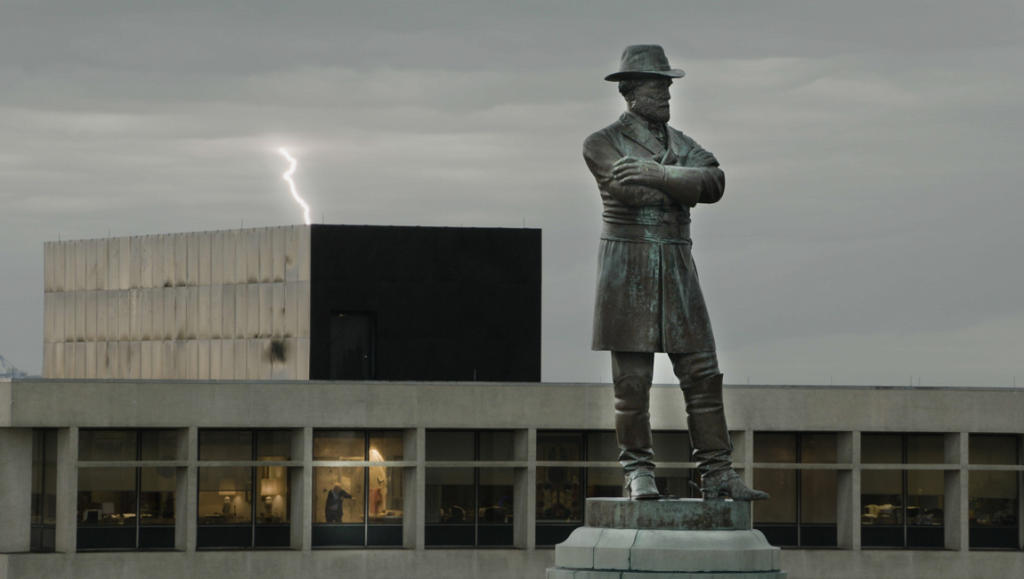The Neutral Ground succeeds as both zippy, deadpan commentary and a moving personal document.
With Juneteenth a newly-minted federal holiday, it’s a fitting opportunity to revisit a particularly fascinating moment in our country’s ongoing reckoning with its white supremist past: the battle over four Confederate monuments in New Orleans, which comedian CJ Hunt tackles with humor and sensitivity in his documentary The Neutral Ground. Hunt, with his unassuming manner and deadpan delivery, has a Louis Theroux-like talent for inserting himself into uncomfortable situations and getting subjects to open up. He interviews all sorts of people for whom the term “redneck” is almost certainly a point of pride, including exactly the type of folks you’d imagine hanging out at a Confederate battle re-enactment. Through interviews and close reads of state secession papers, Hunt concludes that it’s impossible to remove slavery from the cause of the Confederacy — and therefore impossible for Confederate monuments to exist without upholding the philosophy of white supremacy. In fact, in one egregious example, the words “white supremacy” are literally carved into the stone — which you’d think would make the case for destroying all such monuments rather self-evident. And yet, 150 years after the Civil War, this group of insurrectionists still has a powerful grip on our nation’s imagination.
The reason is the Lost Cause, an ideology that derived from a need to make sense of the war’s unprecedented death toll and, above all, to separate the Civil War from the institution of slavery. Through the Lost Cause, the war was couched as an issue of “state’s rights,” a willful revision that persists today. Through this mythology — which, as one interviewer points out, was propped up by the North as much as it was created by the South — a false narrative of benevolent slaveholders and happy, well-treated slaves proliferated through school textbooks, pop culture, and other channels, including Confederate monuments. It’s no surprise, Hunt notes, that they were often erected in response to periods of Black enfranchisement, such as Reconstruction and the Civil Rights era. In 2015, the Lost Cause collided with the Black Lives Matter movement when, in response to the Emanuel African Methodist Episcopal Church shooting in Charleston, SC, the New Orleans City Council voted to remove four monuments throughout the city.
Hunt, who is Black and Filipino, was ambivalent about his Blackness as a child and young adult. It was only when he moved to New Orleans, with its large number of Confederate statues, that he began questioning what it meant for Blackness and the Confederacy to be forced to co-exist, over a century after the Civil War. Some of the documentary’s most fascinating and moving scenes depict Hunt’s introspection regarding his own Blackness, often through on-screen interviews with his father. This level of personal investment gives The Neutral Ground a sense of urgency and narrative growth that distinguishes it from other documentaries about the history of Blackness in America, such as Ava Duverney’s 13th.
The first half of The Neutral Ground is zippy and deadpan, clearly indebted to the comedy-news structure of programs like The Daily Show (where, incidentally, Hunt works as a field producer.) The tone shifts in the last third, however, as Hunt reports on the deadly white nationalist march in Charlottesville, Virginia. There, participants have abandoned all pretense about supporting the Confederacy as a legitimate period of American history, and instead have gathered to actively celebrate and promote white supremacy. Hunt, after talking to his father about his newfound rage, ends the documentary by participating in a performance art piece about a slave uprising. Contrasted with his outsider status at the Confederate battle reenactment, it’s a moment of catharsis: here, and for the first time in the documentary, Hunt connects Blackness to individual and collective agency rather than trauma and abuse. For Hunt, Blackness doesn’t have to be, and in fact shouldn’t be, defined by pain or anger. Equally important are moments of hope and joy, as illustrated in the documentary’s final montage of Confederate statues being toppled around the country. “Symbols represent systems,” an activist tells a crowd of protesters in New Orleans. Hopefully, we as a nation will recognize that the symbolism of a Juneteenth holiday carries as much weight as the removal of brass and stone, and erect new systems accordingly.
You can stream CJ Hunt’s The Neutral Ground on POV on PBS beginning on July 5.
Originally published as part of Tribeca Film Festival 2021 — Dispatch 7.


Comments are closed.